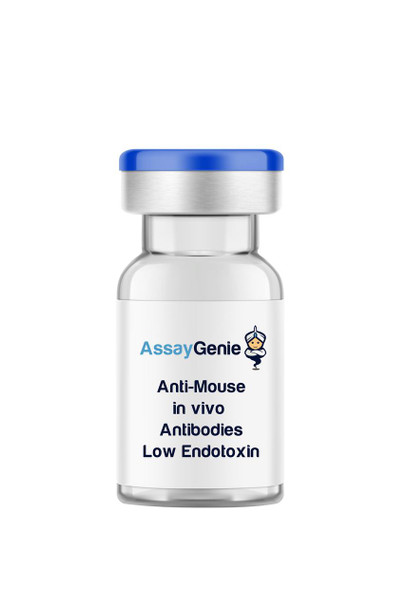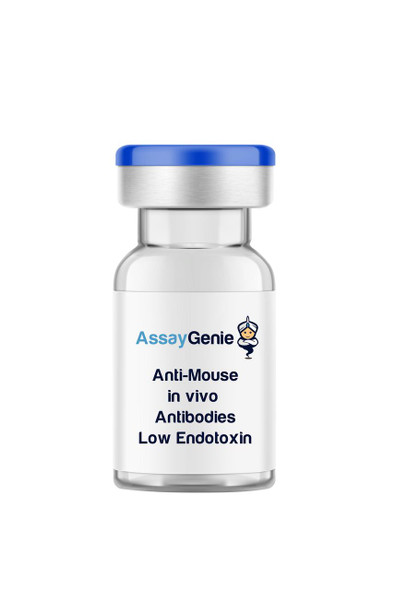Description
Anti-Mouse Dendritic Cells In Vivo Antibody - Low Endotoxin
Introducing the Anti-Mouse Dendritic Cells In Vivo Antibody - Low Endotoxin from Assay Genie, a highly specific monoclonal antibody meticulously designed for in vivo applications. This antibody targets dendritic cells, pivotal for initiating and modulating immune responses, making it an indispensable tool for research in immunology and related fields. With a low endotoxin level (<1.0 EU/mg), this antibody is optimal for sensitive assays including ELISA, flow cytometry, immunohistochemistry, and more. Available in various sizes for flexibility in experimental design, it is formulated in phosphate-buffered saline to ensure stability and efficacy.
Elevate your research with the precision and reliability of this versatile antibody. Dendritic cells are antigen-presenting cells that play a critical role in the immune system by capturing, processing, and presenting antigens to T-cells, thus triggering an adaptive immune response. These cells are essential for both the induction of immune responses and the maintenance of tolerance, underscoring their importance in both health and disease states.
| Product Name: | Anti-Mouse Dendritic Cells In Vivo Antibody - Low Endotoxin |
| Product Code: | IVMB0164 |
| Size: | 1mg, 5mg, 25mg, 50mg, 100mg |
| Clone: | 33D1 |
| Protein: | Dendritic Cells |
| Product Type: | Monoclonal Antibody |
| Synonyms: | DC Marker, 33D1, DCIR2 (dendritic cell inhibitory receptor 2) |
| Isotype: | Rat IgG2b κ |
| Reactivity: | Mouse |
| Immunogen: | Dendritic cells |
| Applications: | WB |
| Formulation: | This monoclonal antibody is aseptically packaged and formulated in 0.01 M phosphate buffered saline (150 mM NaCl) PBS pH 7.2 - 7.4 with no carrier protein, potassium, calcium or preservatives added. |
| Endotoxin Level: | < 1.0 EU/mg as determined by the LAL method |
| Purity: | ≥95% monomer by analytical SEC >95% by SDS Page |
| Preparation: | Functional grade preclinical antibodies are manufactured in an animal free facility using only In vitro protein free cell culture techniques and are purified by a multi-step process including the use of protein A or G to assure extremely low levels of endotoxins, leachable protein A or aggregates. |
| Storage and Handling: | Functional grade preclinical antibodies may be stored sterile as received at 2-8°C for up to one month. For longer term storage, aseptically aliquot in working volumes without diluting and store at -80°C. Avoid Repeated Freeze Thaw Cycles. |
| Applications: | WB |
| Reactivity: | Mouse |
| Host Species: | Rat |
| Specificity: | Clone 33D1 recognizes mouse DCIR2. |
| Antigen Distribution: | Murine DCIR2 is found on dendritic cells of the thymus, spleen, lymph nodes, and Peyer’s patches. DCs in the bone marrow may express DCIR2 in the presence of GM-CSF. However, this expression is notably downregulated when IL-4 is present. Furthermore, DCIR2 has been found In vivo on brain dendritic cells post infection with T. gondii. |
| Immunogen: | Dendritic cells |
| Concentration: | ≥ 5.0 mg/ml |
| Endotoxin Level: | < 1.0 EU/mg as determined by the LAL method |
| Purity: | ≥95% monomer by analytical SEC >95% by SDS Page |
| Formulation: | This monoclonal antibody is aseptically packaged and formulated in 0.01 M phosphate buffered saline (150 mM NaCl) PBS pH 7.2 - 7.4 with no carrier protein, potassium, calcium or preservatives added. |
| Preparation: | Functional grade preclinical antibodies are manufactured in an animal free facility using only In vitro protein free cell culture techniques and are purified by a multi-step process including the use of protein A or G to assure extremely low levels of endotoxins, leachable protein A or aggregates. |
| Storage and Handling: | Functional grade preclinical antibodies may be stored sterile as received at 2-8°C for up to one month. For longer term storage, aseptically aliquot in working volumes without diluting and store at -80°C. Avoid Repeated Freeze Thaw Cycles. |
Dendritic cells are antigen presenting cells that have two functions. They scan the body collecting and processing antigen material that they present on the cell surface to T cells, and they maintain T cell tolerance to “self”. The morphology of dendritic cells is characterized by an extremely large surface-to-volume ratio. Murine splenic dendritic cells can occur in two types: myeloid (cDC) and lymphoid (pDC). Lymphoid dendritic cells produce high amounts of IFN-α and are also called Plasmacytoid dendritic cell because they have an appearance similar to plasma cells. Myeloid, or conventional dendritic cells, secrete IL-12, IL-6, TNF, and chemokines and can be further categorized into three subtypes (CD4−CD8+, CD4+CD8− and CD4−CD8−). These differ from other migratory dendritic cells such as Langerhans cells and interstitial dendritic cells that migrate from peripheral tissues to the lymph nodes. The exact nature and biological activity of the dendritic cell surface marker DCIR2 is currently unknown. DCs are known to play a role in several diseases including myeloid cancer, pDC leukemia, HIV, lupus erythematosus, Crohn's disease and ulcerative colitis. However, it is thought that DCs may be able to control cancer progression because increased densities of DC populations have been linked with better clinical outcome. Lung cancers have been found to include four different subsets of dendritic cells; some of which can activate immune cells that can suppress tumor growth. Dendritic cells have also been shown to play a role in the success of cancer immunotherapies in experimental models. Specifically, the immune checkpoint blocker anti-PD-1 has been shown to indirectly activate DCs through IFN-γ released from drug-activated T cells. Agonizing the non-canonical NF-κB pathway also activates DCs and further enhances anti-PD-1 therapy in an IL-12-dependent manner.
| Technical Datasheet: | View |
| Protein: | Dendritic Cells |
| Function: | GM-CSF is reported to increase expression of 33D1 antigen on dendritic cells from bone marrow cells and IL-4 reported to down regulate the 33D1 antigen. |
| Research Area: | Immunology |







